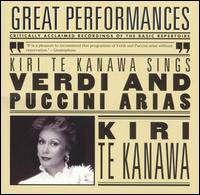All the Things We Still Have
I have to confess that I'm cranky about some of the givens of life in the DC area in 2007: people barricaded behind their iPods and free newspapers, daily warnings of security threats and pollution levels, and of course cellphones going off in cinemas, concert halls, and chapels. We're connected by technology and divided just the same.
And there is genuine sorrow in the recent loss of so many artists, among them singers Beverly Sills, Regine Crespin, and Jerry Hadley, and filmmakers Michelangelo Antonioni and Ingmar Bergman. The latter's Swedish-language film of Mozart's The Magic Flute, featuring the wonderful Hakan Hagegard as Papageno, provided one of the happiest memories of my teenaged years, which surely sets some sort of record on the irony scale.
 In a count-your-musical-blessings exercise I took out Kiri Te Kanawa's Verdi and Puccini Arias, a standard from the Sony full-price catalogue in former years and now reissued as a midline product, with a twist: bonus tracks to give you a more fleshed-out picture of Te Kanawa's career.
In a count-your-musical-blessings exercise I took out Kiri Te Kanawa's Verdi and Puccini Arias, a standard from the Sony full-price catalogue in former years and now reissued as a midline product, with a twist: bonus tracks to give you a more fleshed-out picture of Te Kanawa's career.Actually, the title of the CD is a bit misleading, as the current track listing features no fewer than eight Puccini selections, though some of them are brief, and three Verdi arias. The extras include two tracks from Mozart's Don Giovanni, a selection from Humperdinck's Hansel and Gretel, and the "Pie Jesu" from Durufle's Requiem. This barely warms us up as far as the breadth and versatility of Te Kanawa's stage and recorded performances are concerned, but it does provide a reminder, as if one were needed, of the essential beauty of her voice.
Back in the 1980s, Madison Avenue and the movies made much of Te Kanawa's interpretations of Puccini: "O mio babbino caro" from Gianni Schicchi was pressed into service more than once, most memorably in James Ivory's luminous film adaptation of A Room with a View, which also featured "Chi il bel sogno di Doretta" from La Rondine. If you sigh with happiness at the thought of hearing both of those again, I can assure you that they're here in the collection.
As you might expect, there is also much darker material on the album, as Te Kanawa plays a series of betrayed and bereft women: Donna Elvira in Don Giovanni, Cio-Cio-San in Madama Butterfly, Violetta in La Traviata, Tosca, Manon. Alas, there are no liner notes or texts, but the emotions need little translation from the Italian.
Humperdinck's "Der kleine Sandmann bin ich" is a rather unusual choice for the album, given all that has come before, but Te Kanawa approaches the material with a beguiling tenderness. The recording then comes to a equally gentle but more somber, reflective close with the Durufle "Pie Jesu."
Kiri Te Kanawa has, as of this writing, retired from the opera stage but not from the concert hall. I read that she has a farewell tour in the works for the 2007-2008 season, but no dates for the DC area have been posted online.




0 Comments:
Links to this post:
Create a Link
<< Home